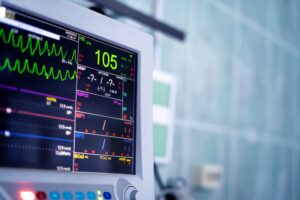Calibrated to Care: 10 Instruments That Help Build Safer, Smarter EKG Machines
 EKG (electrocardiogram) machines are essential tools in modern medicine. From routine checkups to emergency diagnostics, these devices interpret the heart’s electrical signals—helping clinicians detect everything from arrhythmias to life-threatening cardiac events.
EKG (electrocardiogram) machines are essential tools in modern medicine. From routine checkups to emergency diagnostics, these devices interpret the heart’s electrical signals—helping clinicians detect everything from arrhythmias to life-threatening cardiac events.
But the accuracy of an EKG machine doesn’t start at the bedside. It starts in the lab, during design, testing, and manufacturing—where dozens of tools must be calibrated to ensure that every beat, blip, and waveform is captured with precision.
Here are 10 critical instruments used to build and validate EKG machines—and how calibration helps ensure safer outcomes for patients everywhere.
1. Signal Simulators (ECG Simulators)
Purpose: Simulate real cardiac waveforms to test machine functionality
Why It Matters: Calibrated simulators create reliable, repeatable test scenarios, ensuring the EKG machine accurately detects and displays heart activity under all conditions—from normal rhythms to critical arrhythmias.
2. Oscilloscopes
Purpose: Analyze low-voltage EKG signals during development
Why It Matters: Even slight inaccuracies in voltage readings can distort waveform interpretation. A calibrated oscilloscope ensures that every millivolt signal is properly visualized and processed.
3. Multimeters
Purpose: Verify circuit voltage, resistance, and continuity
Why It Matters: EKG machines rely on precise analog circuitry. A miscalibrated multimeter can lead to undetected faults, potentially compromising the device’s accuracy or safety systems.
4. Function Generators
Purpose: Inject known test waveforms into EKG inputs
Why It Matters: Engineers use calibrated function generators to validate signal processing logic. It’s how they ensure the machine interprets cardiac rhythms the way clinicians expect.
5. Digital Storage Oscilloscopes (DSOs)
Purpose: Capture signal behavior over time
Why It Matters: EKGs monitor rhythms continuously. Calibrated DSOs help ensure that timing, amplitude, and waveform shape are faithfully captured during development and quality testing.
6. Patient Simulators
Purpose: Emulate full-body physiological signals during testing
Why It Matters: Calibrated patient simulators help test EKG machine response to variable heart rates, lead disconnects, and abnormal rhythms—mirroring real clinical scenarios to improve reliability.
7. Frequency Counters
Purpose: Verify the heart rate and timing logic of the machine
Why It Matters: A slight error in frequency measurement can mislead a clinician. Calibration ensures that the heart rate calculated by the EKG matches the patient’s true rhythm.
8. EMI/EMC Testers (Electromagnetic Field Meters)
Purpose: Ensure the machine can operate safely near other medical equipment
Why It Matters: Calibrated EMI testers help verify that EKG machines are immune to interference—and won’t interfere with nearby devices in critical care environments.
9. Thermal Chambers
Purpose: Simulate extreme temperatures to test performance
Why It Matters: EKG machines may be used in ambulances, operating rooms, or remote clinics. Calibrated chambers ensure they remain stable across a range of temperatures.
10. Data Acquisition Systems (DAQs)
Purpose: Log analog and digital test data for performance review
Why It Matters: Accurate DAQs ensure developers can trust the data used to fine-tune the device—every decision is only as good as the measurement behind it.
Why It Matters
In healthcare, every decision starts with a measurement—and every measurement must be trustworthy. That’s why calibration is so critical in the development of EKG machines.
From product design to final testing, calibrated instruments ensure that the machines interpreting a patient’s heartbeat are doing it correctly. When you build precision into the process, you build trust into the results—and that trust can save lives.
Monitor with Confidence. Calibrate with SIMCO.
SIMCO provides trusted calibration services to more than 3,000 organizations—including leading names in biomedical, life sciences, and healthcare technology.
With over 60 years of experience and 8 straight industry leadership awards, we’ve earned our reputation as the standard for quality service.
If you’re building or using the tools that monitor heartbeats, let us help you build them right.
Request a fast, no-obligation quote today:
https://www.simco.com/landing/quality-calibration-quote/

